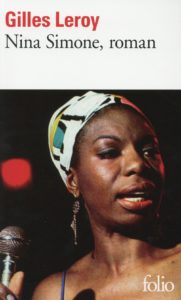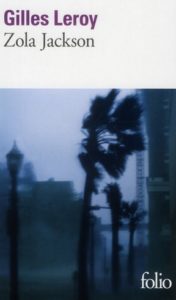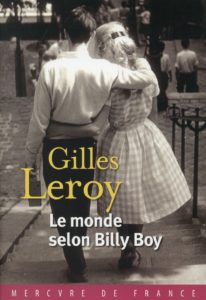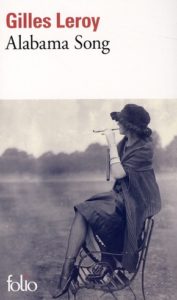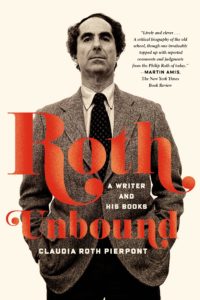Nina Simone: a Novel
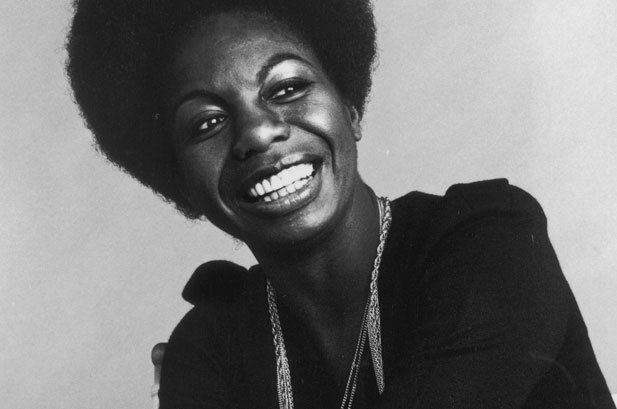
In many ways, Nina Simone’s life was structured like a classic, character-driven novel. How a little girl born Eunice Kathleen Waymon in Tryon, North Carolina went on to become the monolithic Nina Simone is itself a story worth every turned page, but for Gilles Leroy, to understand Simone’s life is to start at the end. After a star-studded career filled with peaks and chasms, we enter her life nearly ten years after she has stopped singing. At once an examination of her extraordinary talent and an attempt at understanding the internal and external factors that worked to destroy her, Nina Simone: A Novel positions Leroy as a master of imagining the story behind a portrait. Her internal landscape comes to the forefront of the narrative in terms of how she feels, what she sees, how she reacts, but most importantly, how the world’s obsession with Simone causes Eunice to forget and eventually lose herself.
Read more on Nina Simone: A Novel here.
Gilles Leroy was born in Bagneux, France in 1958. After studying experimental science in high school, Leroy went on to study literature, eventually obtaining a master’s degree. He then took to learning through travel and immersing himself in American and Japanese literature. The American novel became a major influence for Leroy and influenced his decision to begin writing. He took on a range of odd jobs in the day, writing at night, and eventually became a journalist. Leroy published his first novel Habibi in 1987, and eventually left journalism in 1991 in order to focus fully on writing fiction. Among his most notable works are L’Amant russe (2002), Grandir (2004), and Champ secret (2005). He was awarded the Prix Goncourt, France’s most prestigious literary prize, for his novel Alabama Song (2007), which tells a story from the view of Zelda Fitzgerald, American writer F. Scott Fitzgerald’s wife. The book takes on a mix of biographical and fictional elements, examining the struggles and tragic fate of Zelda’s life. Read more abour Leroy’s novels here.
Claudia Roth Pierpont has been a contributor to The New Yorker since 1990 and became a staff writer in 2004. The subjects of her articles have ranged from the Ballets Russes to the Chrysler Building, from the philosophy of Friedrich Nietzsche to that of Mae West. A collection of eleven of Pierpont’s New Yorker essays, Passionate Minds: Women Rewriting the World, was published in 2000. Nominated for a National Book Critics Circle Award, the book juxtaposes the lives and works of women writers, including Hannah Arendt, Gertrude Stein, Anaïs Nin, Margaret Mitchell, and Zora Neale Hurston. Pierpont has been the recipient of a Whiting Writers’ Award, a Guggenheim Fellowship, and a fellowship at the Cullman Center for Scholars and Writers of the New York Public Library. Roth Unbound (FSG), her authorized biography of Philip Roth, was published to great acclaim in 2013.
J'étais célèbre, on me reconnaissait dans la rue, on m'offrait des concerts dans tout le pays, mes disques sortaient en Europe... Les télévisions me demandaient, les stars de cinéma aussi me réclamaient à leur table, Lauren Bacall, Frank Sinatra, la minuscule Natalie Wood... Mes amis... Learn More
J'étais célèbre, on me reconnaissait dans la rue, on m'offrait des concerts dans tout le pays, mes disques sortaient en Europe... Les télévisions me demandaient, les stars de cinéma aussi me réclamaient à leur table, Lauren Bacall, Frank... Learn More
J'étais célèbre, on me reconnaissait dans la rue, on m'offrait des concerts dans tout le pays, mes disques sortaient en Europe... Les télévisions me demandaient, les stars de cinéma aussi me... Learn More
Août 2005, delta du Mississippi : l'ouragan Katrina s'abat sur La Nouvelle-Orléans. Les digues cèdent sur le lac Pontchartrain et les quartiers modestes sont engloutis. La catastrophe touche de plein fouet la communauté noire. Tandis que ses voisins attendent des secours qui mettront des... Learn More
Août 2005, delta du Mississippi : l'ouragan Katrina s'abat sur La Nouvelle-Orléans. Les digues cèdent sur le lac Pontchartrain et les quartiers modestes sont engloutis. La catastrophe touche de plein fouet la communauté noire. Tandis que ses... Learn More
Août 2005, delta du Mississippi : l'ouragan Katrina s'abat sur La Nouvelle-Orléans. Les digues cèdent sur le lac Pontchartrain et les quartiers modestes sont engloutis. La catastrophe touche de... Learn More
Qui aurais-je été, moi, si Éliane m'avait eu d'un autre homme ? Si elle m'avait conçu avec ce lieutenant Delor, j'aurais été un homme doux, sans doute, et posé comme lui. J'essayais de me représenter physiquement : de taille moyenne, voire petit, de corpulence fine et sèche, j'avais la... Learn More
Qui aurais-je été, moi, si Éliane m'avait eu d'un autre homme ? Si elle m'avait conçu avec ce lieutenant Delor, j'aurais été un homme doux, sans doute, et posé comme lui. J'essayais de me représenter physiquement : de taille moyenne,... Learn More
Qui aurais-je été, moi, si Éliane m'avait eu d'un autre homme ? Si elle m'avait conçu avec ce lieutenant Delor, j'aurais été un homme doux, sans doute, et posé comme lui. J'essayais de me... Learn More
Alabama, 1918. Quand Zelda, " Belle du Sud ", rencontre le lieutenant Scott Fitzgerald, sa vie prend un tournant décisif. Lui s'est juré de devenir écrivain : le succès retentissant de son premier roman lui donne raison. Le couple devient la coqueluche du Tout - New York. Mais Scott et Zelda... Learn More
Alabama, 1918. Quand Zelda, " Belle du Sud ", rencontre le lieutenant Scott Fitzgerald, sa vie prend un tournant décisif. Lui s'est juré de devenir écrivain : le succès retentissant de son premier roman lui donne raison. Le couple devient la... Learn More
Alabama, 1918. Quand Zelda, " Belle du Sud ", rencontre le lieutenant Scott Fitzgerald, sa vie prend un tournant décisif. Lui s'est juré de devenir écrivain : le succès retentissant de son... Learn More
J'étais célèbre, on me reconnaissait dans la rue, on m'offrait des concerts dans tout le pays, mes disques sortaient en Europe... Les télévisions me demandaient, les stars de cinéma aussi me réclamaient à leur table, Lauren Bacall, Frank Sinatra, la minuscule Natalie Wood... Mes amis... Learn More
J'étais célèbre, on me reconnaissait dans la rue, on m'offrait des concerts dans tout le pays, mes disques sortaient en Europe... Les télévisions me demandaient, les stars de cinéma aussi me réclamaient à leur table, Lauren Bacall, Frank... Learn More
J'étais célèbre, on me reconnaissait dans la rue, on m'offrait des concerts dans tout le pays, mes disques sortaient en Europe... Les télévisions me demandaient, les stars de cinéma aussi me... Learn More
Août 2005, delta du Mississippi : l'ouragan Katrina s'abat sur La Nouvelle-Orléans. Les digues cèdent sur le lac Pontchartrain et les quartiers modestes sont engloutis. La catastrophe touche de plein fouet la communauté noire. Tandis que ses voisins attendent des secours qui mettront des... Learn More
Août 2005, delta du Mississippi : l'ouragan Katrina s'abat sur La Nouvelle-Orléans. Les digues cèdent sur le lac Pontchartrain et les quartiers modestes sont engloutis. La catastrophe touche de plein fouet la communauté noire. Tandis que ses... Learn More
Août 2005, delta du Mississippi : l'ouragan Katrina s'abat sur La Nouvelle-Orléans. Les digues cèdent sur le lac Pontchartrain et les quartiers modestes sont engloutis. La catastrophe touche de... Learn More
Qui aurais-je été, moi, si Éliane m'avait eu d'un autre homme ? Si elle m'avait conçu avec ce lieutenant Delor, j'aurais été un homme doux, sans doute, et posé comme lui. J'essayais de me représenter physiquement : de taille moyenne, voire petit, de corpulence fine et sèche, j'avais la... Learn More
Qui aurais-je été, moi, si Éliane m'avait eu d'un autre homme ? Si elle m'avait conçu avec ce lieutenant Delor, j'aurais été un homme doux, sans doute, et posé comme lui. J'essayais de me représenter physiquement : de taille moyenne,... Learn More
Qui aurais-je été, moi, si Éliane m'avait eu d'un autre homme ? Si elle m'avait conçu avec ce lieutenant Delor, j'aurais été un homme doux, sans doute, et posé comme lui. J'essayais de me... Learn More
Alabama, 1918. Quand Zelda, " Belle du Sud ", rencontre le lieutenant Scott Fitzgerald, sa vie prend un tournant décisif. Lui s'est juré de devenir écrivain : le succès retentissant de son premier roman lui donne raison. Le couple devient la coqueluche du Tout - New York. Mais Scott et Zelda... Learn More
Alabama, 1918. Quand Zelda, " Belle du Sud ", rencontre le lieutenant Scott Fitzgerald, sa vie prend un tournant décisif. Lui s'est juré de devenir écrivain : le succès retentissant de son premier roman lui donne raison. Le couple devient la... Learn More
Alabama, 1918. Quand Zelda, " Belle du Sud ", rencontre le lieutenant Scott Fitzgerald, sa vie prend un tournant décisif. Lui s'est juré de devenir écrivain : le succès retentissant de son... Learn More
J'étais célèbre, on me reconnaissait dans la rue, on m'offrait des concerts dans tout le pays, mes disques sortaient en Europe... Les télévisions me demandaient, les stars de cinéma aussi me réclamaient à leur table, Lauren Bacall, Frank Sinatra, la minuscule Natalie Wood... Mes amis... Learn More
J'étais célèbre, on me reconnaissait dans la rue, on m'offrait des concerts dans tout le pays, mes disques sortaient en Europe... Les télévisions me demandaient, les stars de cinéma aussi me réclamaient à leur table, Lauren Bacall, Frank... Learn More
J'étais célèbre, on me reconnaissait dans la rue, on m'offrait des concerts dans tout le pays, mes disques sortaient en Europe... Les télévisions me demandaient, les stars de cinéma aussi me... Learn More
Août 2005, delta du Mississippi : l'ouragan Katrina s'abat sur La Nouvelle-Orléans. Les digues cèdent sur le lac Pontchartrain et les quartiers modestes sont engloutis. La catastrophe touche de plein fouet la communauté noire. Tandis que ses voisins attendent des secours qui mettront des... Learn More
Août 2005, delta du Mississippi : l'ouragan Katrina s'abat sur La Nouvelle-Orléans. Les digues cèdent sur le lac Pontchartrain et les quartiers modestes sont engloutis. La catastrophe touche de plein fouet la communauté noire. Tandis que ses... Learn More
Août 2005, delta du Mississippi : l'ouragan Katrina s'abat sur La Nouvelle-Orléans. Les digues cèdent sur le lac Pontchartrain et les quartiers modestes sont engloutis. La catastrophe touche de... Learn More
Qui aurais-je été, moi, si Éliane m'avait eu d'un autre homme ? Si elle m'avait conçu avec ce lieutenant Delor, j'aurais été un homme doux, sans doute, et posé comme lui. J'essayais de me représenter physiquement : de taille moyenne, voire petit, de corpulence fine et sèche, j'avais la... Learn More
Qui aurais-je été, moi, si Éliane m'avait eu d'un autre homme ? Si elle m'avait conçu avec ce lieutenant Delor, j'aurais été un homme doux, sans doute, et posé comme lui. J'essayais de me représenter physiquement : de taille moyenne,... Learn More
Qui aurais-je été, moi, si Éliane m'avait eu d'un autre homme ? Si elle m'avait conçu avec ce lieutenant Delor, j'aurais été un homme doux, sans doute, et posé comme lui. J'essayais de me... Learn More
Alabama, 1918. Quand Zelda, " Belle du Sud ", rencontre le lieutenant Scott Fitzgerald, sa vie prend un tournant décisif. Lui s'est juré de devenir écrivain : le succès retentissant de son premier roman lui donne raison. Le couple devient la coqueluche du Tout - New York. Mais Scott et Zelda... Learn More
Alabama, 1918. Quand Zelda, " Belle du Sud ", rencontre le lieutenant Scott Fitzgerald, sa vie prend un tournant décisif. Lui s'est juré de devenir écrivain : le succès retentissant de son premier roman lui donne raison. Le couple devient la... Learn More
Alabama, 1918. Quand Zelda, " Belle du Sud ", rencontre le lieutenant Scott Fitzgerald, sa vie prend un tournant décisif. Lui s'est juré de devenir écrivain : le succès retentissant de son... Learn More


